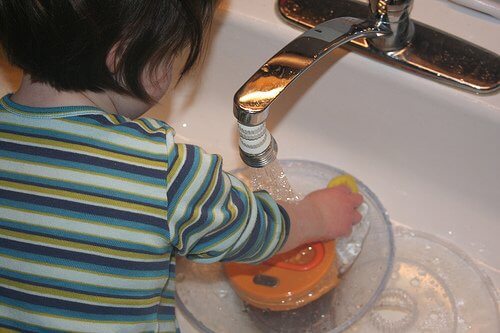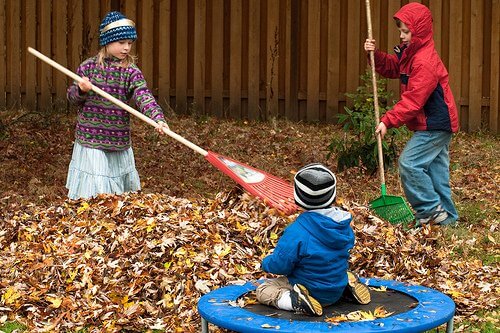11 Ways to Teach Your Children to Be Diligent Workers

As 2011 comes to an end, we’re sharing helpful lists to help you save money, stay healthy, get organized, creatively repurpose, frugally gift-give, intentionally celebrate and more in our “11 Things for 2011” series throughout these holiday months.
Written by Beth Corcoran, Contributing Writer
About a year ago, I was exhausted by the amount of work I had to do to keep everything running smoothly with my ever growing family. (We’re at six kids now!) And I was feeling burdened that my kids needed to learn to help out more around the house—more than just brushing their teeth and making their beds. I set out to find ways to teach my children to be diligent workers and to have effective strategies to manage chores in my home.
So, this year has been a journey into teaching our children to help out in bigger or more meaningful ways around the house. Of course, I’m nowhere near done teaching them everything they need to know about housework and habits, but we have come a long way in just one year. And because my kids are taking care of more of the housework, I can focus more attention on other important duties such as homeschooling.
And I would like to share some of what I have learned as I seek to teach my kids to be diligent in their work. As a disclaimer, I’d like to add that I am definitely preaching to myself as I list all these ways to help children become diligent workers!
1. Pray!
This is always the wisest starting point in whatever we do. Starting any new journey or routine is best done by acknowledging that we don’t know what to do. God grants wisdom to those who ask.
Lately, I’ve been seeing God’s faithfulness to answer my prayers for wisdom. We’ve had some trouble with certain aspects of habit training with some of my kids, and God has been very faithful to provide us with creative solutions each step of the way.
2. Model What You Teach
This is something that Lord has been showing me lately. Kids really need to see diligent, cheerful work modeled to them. If mom is grumpy while working, or waiting to get all her chores done after the kids’ bedtime (guilty!), then the kids never get to see godly work in action. All they see is mom grumbling and complaining or procrastinating.
Try to do as many chores as possible in front of your children, and be very aware of your attitude as you do them. If you are being merry as you work, your children will see that and most likely do the same!
3. Read Proverbs
Our family has found that reading passages about work has been an invaluable tool. Each day, our family reads through a chapter of Proverbs and discusses it. There are so many great passages about what God expects as we work.
By reading Proverbs to the kids, they have started to understand the difference between being a diligent worker and a sluggard, and why it is far better to be a hard worker. These passages have given the kids a Biblical vocabulary concerning work.
4. Have a System
As a family, figure out what chores need to be done and who is going to do them. There are many different ways of helping children figure out what chores need to be done. There are chore charts, sticker charts and things of that nature. I’ve even seen ping pong balls with chores written on them and each child grabs a ball and does that chore. There are definitely some creative ideas out there!
Our family has found great benefit from using the chore pack system found in the Managers of their Chores book by Steve and Teri Maxwell. (I believe this is what Stephanie uses with her children as well.) We don’t follow the program exactly, but we do follow the basic concept and it has helped our children to understand what chores are expected of them. It also provides a great deal of accountability for the children to actually complete what they need to get done.
Whatever you choose, stick with your system for a while before tweaking it. Children thrive by routine, so don’t change things unless it just really isn’t working for your family.
5. Use Rewards and Consequences
As you teach your child how to work, it’s important to have predictable rewards and consequences. Our heart for our children is to teach them not just to do a job, but to do it for the glory of the Lord. To that end, my husband and I try to give rewards when we see our kids working thoroughly, diligently and with a cheerful attitude.
When I praise my children for working hard, I try not to merely praise them for a job completed. I try to praise them for their godly attitude or endurance. My kids also know that with more work comes more privileges. My 9 year old daughter has become quite responsible around the house and therefore enjoys a bedtime a full hour later than the rest of the children.
Grumbling and complaining, fit throwing (we see a great deal of fits at my house), incomplete jobs, and flat out disobedience are given consequences. If the kids do not do a complete job, then they are given an extra job to complete off of a list of chores that are reserved especially for consequences.

Image credit: jbrownell
6. Give Them the Tools They Need
It’s really hard to expect a little child with little hands to navigate the floors with a large broom. And it would be quite unsafe to give a bottle of bathroom cleaner to a young child and tell them to spray away.
Even very young children are capable of quite a lot if they are given the right cleaning tools. I’ve even noticed that when my kids have the proper tools, the work is much more enjoyable.
A good example of what I mean is sweeping the floor. We have a lot of tile in our house, so all my kids, at some point in the day, have to sweep a floor somewhere in my house. My oldest two are able to use a full size broom well, but the rest are too small. So we have a stockpile of small hand brooms and dust pans for the littles to use. This enables them to help just like the big kids. They even enjoy sweeping up piles that the older ones make.
7. Make It Fun!
Work is not always fun, but it doesn’t always have to be miserable either. We don’t want to teach our children that work has to be fun all the time, but sometimes it brings great joy to make chore time into a game or a play time.
Have some fun, make it a race against the clock, listen to some silly music while working or something along those lines. It will keep the joy in working.
8. Inspect What You Expect
I don’t even remember where I first heard the phrase “Inspect what you expect.” Those are wise words. Children quickly learn what you do and do not inspect.
And due to their sin natures, they will exploit where you do not inspect. Therefore, it is so important to regularly inspect their work in order to keep a high standard.
9. Practice, Practice, Practice
This is something I struggle with greatly! In my mind, it seems perfectly reasonable that I should be able to show my children how to do something a couple of times and then they can do it without error. Afterall, most adults can do it this way.
This is not so with children. Children need lots of practice to learn a skill. My son Joshua has been practicing wiping down the kitchen table properly for months now, and he is just now starting to do a really good job.
If you see that your child is struggling with a certain skill, try to find ways throughout the day to develop the skill. For instance, if your child struggles with wiping down the counters, you might have them practice at each meal and also practice wiping down the bathroom counters.
10. Use Resources
There are many high quality resources for families out there! If you find yourself getting stuck and are looking for creative ideas for your children, here are some great resources that our family uses. I hope they bless you as much as they have blessed us!
Managers of their Chores—This is the book that highlights how to use chore packs to help your children with chores. The Maxwell family at Titus2 Ministries has many other useful resources as well.
Doorposts Charts—Our family uses several of the charts from this ministry. The “Go to the Ant” chart teaches children about working diligently. We also use the “Blessings Chart” and the “If/Then Chart” to give our kids predictable rewards and consequences. We really like these because they focus on attitudes of the heart rather than just pure behavior modification. These are the rewards and consequence charts that I talked about earlier in this post.
Large Family Logistics—I feel like I’m constantly promoting this book to my friends. It has some great ideas for family management—no matter the size of your family. It’s like sitting down with an experienced mother and homemaker and picking her brain for fresh ideas.
11. Focus on the Heart
I’ve talked about this several times now, but I want to end with this because it is so important. In our kids’ chore and habit training, it is so important to focus on the heart above all else.
So many chore systems are simple behavior modification, but as Christians we should be teaching our children to do everything as an act of worship to the Lord.
Sometimes by focusing on the heart rather just on whether or not a chore was done exactly right slows things down. But it is worth the time because in the end, our children will not just have learned responsibility, but they will also have learned godliness.






Thank you so much for this post! I am so frustrated with trying to manage my home. I KNOW it is partly because I am inconsistent in EVERYTHING I do, including training my children. There are some very good suggestions here, now, if only I can be consistent…
I think it is very important to let your children see you do chores happily, because that attitude is contagious. I think your view of children is rather negative though. I do not view children as exploitative. Even as adults, we often work best only on whats seen (think company).
@Talia, I understand your concern. I was hoping to show that teaching children about chores is really a heart issue. Because of our deep rooted sin issues, Children and adults alike take advantage of situations where their work is not being inspected. But we are trying to teach our children that if they have been asked to do something, they need to follow through to the best of their ability because, even if people aren’t watching, God is. I have always heard character defined as “what you do when no one is around.”. And we want our kids to have godly character. We are not demanding perfection. By God’s grace, We are just trying to train our children to step up to a higher calling than the world expects.
Thanks so much for this post! My only son is about 18 months now, and I often do my chores while he is playing. I will have to bookmark this page for the next 6-12 months when he gets a little older and can really start helping with some chores. I love how you have infused working for the Lord and with joy in most of the steps. It’s convicting and encouraging for me right now!
@Sara, I’ve found personally that even at that age they can help and want to, of course not like older kids but they can do some things. I remember at that age both my kids helping sort laundry into piles, or passing me things to hang on the clothesline, or throwing things I hand them into the dryer, sort the non sharp items from the dishwasher into the correct utensil spot, etc. It takes more time (and that is often hard) but its starting them young on the concept, which I think really helps. Now that my oldest is 6 soon, its amazing the things she can do. We do have to make sure we don’t have a perfection mindset, especially the younger the kids are, but I think its good for them to learn even at a young age as soon as they are able (in my experience I found around 12-14 months they could start doing some simple things and they LOVED it).
@Nola, don’t get me wrong, my son definately helps. I guess I was thinking more along the lines of assigned chores. He is really good at helping clean his high chair after each meal, throwing things away, and cleaning up his toys. Thanks for the reminder on the perfectionist mindset. I was raised to be “perfect” and it’s something I’ve struggled with since accepting Christ as an adult. I pray that I do not put those expectations on my family.
@Sara, That makes sense, hopefully I didn’t come across the wrong way. 🙂 I was also raised to be perfect, so its also a struggle for me. I think that if we are aware it can be an issue that is the first step! I want to break that cycle with my generation so my kids don’t have to grow up that way. Enjoy your son!
Thanks for the great post. I have four kids, three home schooled and we live on a farm. I struggle greatly with household chores, as I’m not much of a house keeper. We have attitude problems on occasion, I like your suggestions. I’ll check out the resources you mentioned and read Psalms with our children. Such great Ideas!
Consistency is such a struggle for me, as well. I have four children (homeschooled) 7 down to 9 months, and I feel weary so often with all that I have to keep up with in the home. I’ve read Large Family Logistics and loved it! I will continue to reference that one as I try to put things into practice. I’ve also really enjoyed reading the autobiography of the Duggar family, “20 kids and Counting”. There is a lot of wisdom to be gained from reading these resources. I really want to try the charts. I always fear buying any of those types of things, though, because my follow-through is terrible! I loved your first suggestion of prayer! When it all comes down to it, asking God for strength and grace and discipline daily is of the utmost importance in this challenging journey! I’ve learned as I grow in my relationship with Christ, that God is a God of balance. He is SO steady. I am so far from balanced, so I must pray for that daily!
oh, and I’m really looking forward to hearing suggestions from others of what has worked for them! 🙂
This is a great post! I have 4 children, one in school all day and the other three are younger and still home. I have heard/read many great ideas from families that are homeschooling and have their children at home all day long. I am struggling with my oldest as she is gone a great deal of the day and then has to do her chores when she comes home. She really is not having a good attitude, but we are working on that. I appreciate the advice in this post!
What an encouraging post! This is exactly what my husband and I have been working on with our children. Thanks for the great ideas and resources. I am, however, having a hard time finding some of the resources here in Canda. Any suggestions on where I could get some of these books in the great white north?
Great Post!
I love this post, thank you for sharing. I am also just starting to develop better ways for my children to help around the house. Its something I was trying to do just by letting them help me as I was doing something- but as they have gotten older its not working for us. I tend to just not let them help (which is my own heart issue) and then they end up not doing any work other than a few small things. It wasn’t working, so I tried to find a system that would work for me. I wasn’t aware of the Chore Packs at the time, or that may have been an answer for me. It might still be something I save up for, but for now, what we are doing is working quite well. Each day I have chore time, and I write 3 chores for the child to do on a chart (just a simple chart with two sections since I currently have two children). The chores are chosen based on what needs to be done. It doesn’t include daily things for us that my oldest just remembers (she has a detailed mind, other families this wouldn’t work for, nor will it work for all my kids I assume). I have a list near my chart(which is on the kitchen wall) of all the possible chores that each child can do at this stage (will update it as needed). They are sectioned into parts of the house eg. bathroom, kitchen etc. then I just pick a chore based on what really needs doing, what I want them to learn, how much time and energy I have to inspect or train, etc. etc. I write it on the chart, and when its done, they get a sticker, if its done with a good attitude and to the best of their ability. If not, they get further training and just a check mark (they really like stickers).
So this is working well for us right now. Its better for me since its not the same thing every Monday for example and can be tailored for what really needs to be done that day or if we have less time for some other reason etc.
Oh I also wanted to ask, have you read or do you follow the Managers of their homes book by the Maxwells. I have been looking into that one. However it does sound really ridgid to me. If I were to use it I would use it more as a timeline than a strict thing, especially when it comes to babies (I read its heavy on strict scheduling, which I don’t want for my own family personally). So I don’t know if I want to spend the money on it or not. But I want some tips and tricks from a been-there-done-that homeschooling mom. I also have been looking into the large family logistics book. I am going to have my 3rd soon. But I wasn’t sure it would really apply to a family of just 3 kids, if we don’t have any more. I would love more but we’ll have to see what my health and God allows for.
@Nola, I have read through other books by the Maxwells concerning scheduling. I agree, it’s far too rigid for our family. I think the spirit behind it is right, though–trying to be good stewards of the time given to us. The Maxwell’s lifestyle with all their traveling is far different than ours, so I can see that they would need to have a rigid schedule to get anything done in life. We do strict schedules in the morning before my husband leaves and then in the evening once he gets home. That way we can have maximum time together as a family. During the day, we follow more relaxed routines for schools and chores, etc.
To answer your last question, Large Family Logistics is great regardless of your family size. Some things may not apply, but overall you’ll glean a lot from the book.
@Beth Corcoran, So are there any other tips in the Maxwell’s books particularly the MOTH book that will help me when I don’t want ridgid scheduling all day? I agree, I have ridgid schedules for some of the time, but not others. I have a general guideline for my day and general times. I just don’t know if her book is ALL about how to plan a ridgid schedule, or whether there are other tips in there too that would apply to me who wants tips on how things could flow even better but without that kind of intense structure. Its hard to tell of her website.
Definitely love #1. It’s so true!! I’m not so good at #8 (Inspection). I had a hard time growing up, with my Mom comparing my work to my older brother’s. I hated cleaning because it was never quite good enough. This progressed later on into my own home. If I couldn’t do it perfect, I didn’t want to do it at all. I’ve learned that something is better than nothing. At the same time, I’m trying to teach my children to work diligently and compliment them each time. Thanks again for your thorough and thoughtful post.
@Kristy @ Almost On Purpose, That is something I can very much relate to! I have had similar struggles. I used to swing from one extreme (perfection) to the other (apathy.) God has been working on my heart, showing me that he does not demand perfection (or even for us to look like we have it all together.) I assure you I don’t have it all together! I know it’s hard to see that spirit through a blog. But what we are trying to teach our kids is that God demands obedience. It’s not about the outward behavior, but it’s about the thoughts and intentions of the heart. We can work halfheartedly and maybe get some chores done, or we can work wholeheartedly as an act of worship to the Lord.
I love this. What has really helped me is consistency and her seeing me work diligently. I LOVE to clean up, organize, do chores and she sees that I love it! I do it while listening to focus on the family radio, classical music, etc.. and it makes it that much more enjoyable.
Funny that you wrote about this today, as I was just sharing about what works for us on my blog today. We have made chore cards to help keep us in our routine and keeps our house running smoothly. We’re just geting back into using them regularly, so we’re not quite to the running smoothy stage yet, but I remember what it’s like when we use them regularly! If any of you would like to see (and/or use) my cards…..you can find them here:
http://www.sidetrackedsarah.com/2011/10/free-chore-cards-for-your-family.html
Thanks for this great article… this is one aspect of parenting where mostly I think I do a pretty good job… I could list the many aspects where that is not so much the case 😉
One tip I heard a few years ago was when a job needs to be done, give it to the youngest child who is capable of learning it… that way you avoid overloading the older children (because they are more capable) and neglecting to train the younger ones. I try and use this rule every day.
My 18 month old LOVES to be a “helper”… he sees his older brother (4 and a half) and sister (nearly 3) helping me and he comes up to me and peers up into my face and says “Mummy? Helper?” So I give him a job to do- he can take dirty washing to the washing basket, put shoes away on the shoe rack, put books away on the kids’ bookshelf, as well as fetch things for me, etc. The first few times, I would escort him and show him where to put the thing I’d given him and then he’d remember it by himself… he is so proud of himself when I say “Oh! What a good helper! Thank you!”
The oldest, 4 and a half, can sweep, vacuum, clean the bathroom (take things off the cabinet, wipe the sink, dry wipe the sink, put things back on neatly, straighten up), sort the laundry and put it away (except sheets and a few hard to reach places), etc. My nearly 3-year-old can put some items of laundry away and she is my gopher for things that the 18 month old doesn’t know yet. She can also tidy a room by herself if she knows where each thing goes and can reach it. She’s now in training to take over Mr 4 and a half’s job of emptying the dirty washing basket into the washing machine.
they are such a help to me and I make sure they know it! They really do take a lot of pride in their ability to do those things and be a valuable help to Mummy!
@Anita, I like your suggestion about giving chores to the youngest capable child. I will have to try that!
@Anita, I like that idea about the youngest child too. I sometimes split chores eg. if I have a load of towels, the younger one (2.5) gets the washcloths and handtowels, the older one (5.5) gets to do the towels. But its tempting just to let the older one do it all since its faster, easier, is done “better” and I don’t have to train her to do it since she already was trained by me to do it. But, if I don’t work on it with the younger one, she won’t be trained later.
This is a great post with great suggestions Beth! I have a 6 and a 4 year old that I have been struggling to figure out how to get them more involved. It just seems like there is so much they CAN”T do sometimes. Even though I know I need to be a little more creative in helping them do more. They do all of their self care, dressing making beds etc. They are even getting most of their own food from the kitchen (outside of cooked food). But when it comes to cleaning, I’m sure there are some things I could and should ask them to do. The problem is….me taking the time to teach them. sounds horrible I know. So I think I will take your first suggestion and pray about! Thanks
We were talking about this yesterday on my Facebook page. It depends on a child’s personality and learning style, too. My oldest is very”global,” so she can look at a room with a few things out of place and say “It’s clean” and mean it. She misses the little things. It’s NOT disobedience. She just doesn’t think that way. So, I have to remain patient and help her see the things that need help. Training takes a long time! Understanding who they are is key.
I am doing this with my children as well. Over at http://www.thezkids.blogspot.com you can see some of our work and track our progress. Thanks for this encouragement!
Thank you so much for this post! Do you have a particular time during the day that you do chores? We homeschool also and it seems difficult to find the time to do chores!
@April @ ecoMomical Me, We do chores right after breakfast, right after lunch, late afternoon before Daddy gets home, and then after dinner. By breaking them up throughout the day, the house stays (relatively) clean and we don’t have to do everything at once.
I read through several comments and didn’t see this idea, but I hope I’m not repeating someone. 🙂 I have a very responsible 7 year old who does some amazing work! I have noticed in her a big desire to teach our 3 year old lately. The 7 year old does the laundry most of the time around here, and I love to see her teaching her brother to sort darks and lights. He’ll pick something up out of the hamper, and she’ll guide him as to which pile to put it in. She also asks him almost every morning if he would like to “help” her feed the dogs. So my idea is this: if you have a child that is really good at something, encourage them to teach the younger ones. They will be learning life skills in doing AND teaching!
This is great stuff. Could I have permission to republish (with attribution) in my ministry newsletter?
Thanks
Great thinking 🙂 You are hitting the nail on the head. When my kids were young, lets say 4,6, & 8, (now 38, 36, 34), on the cleaning day of my choice (how it fit our current schedule that month, week etc: we home schooled and ran a daycare) we put the names of cleaning jobs on pieces of paper (jobs broken up into manageable parts) and played Pick a Chore for as long as it took to get the cleaning done. We put music on VERY loud and sang and danced our chores away. The personal chores like room picking up, help cooking, making our own bed would be dealt with in a different manner. I would teach them as we went how do do the various jobs and of course pitch in and ‘pick a chore’ myself. The reward was a clean house and time for other fun activities.
These are great tips to assure that our kids will see the value of doing chores. I have just started teaching my son to do some chores. He wasn’t very cooperative at first. Now, I am glad that he is showing some progress. These tips would become really handy in helping me teach my son more about the value of work.
I love the book Large Family Logistics!! My mother-in-law just loaned it to me, and I have been reading it frequently!! It has really freshened my ways of managing my home lately, and I needed a refresher after being sick all summer in my first trimester of my third pregnancy!! Thanks for this great blog post.
LOVE!! LOVE!! LOVE!! This post! Thank you for sharing! I SO need to model and teach my children how to be better/diligent workers! Thank you! 🙂
This is a great artical. Just what I needed to read today. Fruatiin with all that needs to be done. Looking inward and praying to make sure I am showing those godly traits in me. The kids will follow.
Thanks for the reminder.